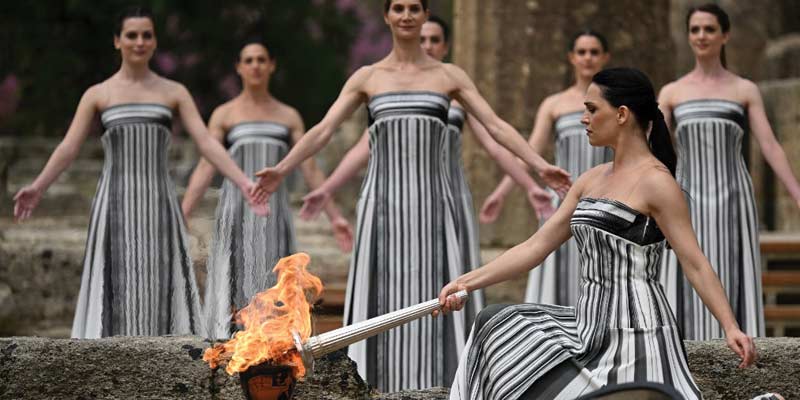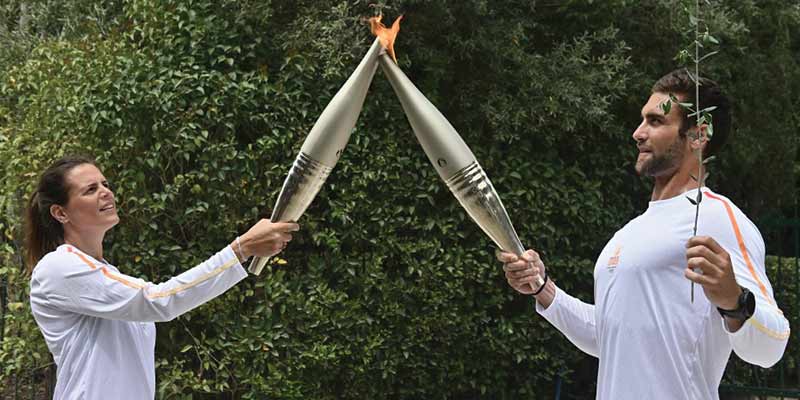- World
- Apr 17
Explainer - What is Olympic flame and torch relay?
• The torch for the Paris 2024 Olympic Games was lit in ancient Olympia in a traditional ceremony on April 16, marking the final stretch of the preparations for the Games’ start on July 26.
• It was ignited at the historic birthplace of the Olympic Games in Ancient Olympia in Greece.
• Greek actress Mary Mina, playing the role of high priestess, lit the torch using a backup flame instead of a parabolic mirror due to cloudy skies for the start of a relay in Greece.
• The flame was passed to the first torchbearer Stefanos Douskos, Greek rower and Tokyo 2020 Olympic gold medallist.
• The relay will culminate with the lighting of the Olympic flame in the French capital at the opening ceremony.
• Hundreds of dignitaries and spectators are attending the ritual in the small Peloponnese town in southwestern Greece where the Olympics were born in 776 BCE, and where the ceremony is held every two years for the summer and winter Olympics.
• The ceremony, conducted at the ruins of the 2,600-year-old Temple of Hera, was headed by International Olympic Committee president Thomas Bach.
• During the 11-day relay on Greek soil, some 600 torchbearers will carry the flame over a distance of 5,000 kilometres through 41 municipalities.
• On April 27, the flame will begin its journey to France on board the 19th-century three-masted barque Belem. A French historical monument, the Belem carried out trade journeys to Brazil, Guyana and into the Caribbean for nearly two decades.
• France’s last surviving three-mast steel-hulled boat, it is expected to arrive in Marseille on May 8.
• Ten thousand torchbearers will then carry the flame across 64 French territories.
• It will travel through 400 towns and dozens of tourist attractions during its 12,000-kilometre journey through mainland France and overseas French territories in the Caribbean, Indian Ocean and Pacific.
• On July 26, it will form the centrepiece of the Paris Olympics opening ceremony.
• Paris is hosting the summer Olympics for a third time after 1900 and 1924.
Olympic flame and torch relay
• The Olympic flame symbolises the message of hope and peace.
• It is a manifestation of the positive values that man has always associated with the symbolism of fire and thus makes the link between the ancient and the modern Games.
• A few months before the opening of the Olympic Games, a flame is lit at Olympia, in Greece.
• The location recalls the link between the Ancient Olympic Games and their modern counterpart.
• As part of the custom, the flame is lit in Olympia in the same way as it was in ancient times, with the aid of a parabolic mirror reflecting the Sun’s rays.
• From there, the flame is carried for a number of weeks to the host city, mainly on foot by runners, but also using other forms of transport.
• The torch harks back to the ancient Olympics when a sacred flame burned throughout the Games.
• The tradition was revived in 1936 for the Berlin Games.
• The modern torches of the Summer and Winter Olympics are built to resist the effects of wind and rain as they carry the Olympic flame, and bear unique designs that represent the host country and the spirit of the Games.
• Throughout the torch relay, the flame announces the Olympic Games and spreads a message of peace and friendship between peoples. The torch relay ends at the opening ceremony of the Olympic Games.
• The final runner (or sometimes runners) enters the stadium and lights the cauldron with the Olympic flame.
International Olympic Committee
• Baron Pierre de Coubertin was the founder of the modern Olympic Games. Inspired by the ancient Olympic Games held in Olympia, Greece, which ended in 393 AD, Frenchman Pierre de Coubertin decided to pursue his project to revive the Olympic Games.
• In 1894 he founded the International Olympic Committee (IOC) at the first Olympic Congress in Paris to help build a peaceful and better world by educating young people through sport. The first Olympic Games of the modern era were held in 1896 in Athens.
• The International Olympic Committee (IOC) is the leader of the Olympic Movement and the guardian of the Olympic Games.
• It is an international non-governmental not-for-profit organisation, in the form of an association.
• It acts as a catalyst for collaboration between all Olympic stakeholders, including the athletes, the National Olympic Committees, the international federations, organising committees for the Olympic Games, the worldwide Olympic partners and Olympic broadcast partners. It also collaborates with public and private authorities including the United Nations and other international organisations.
• The IOC is based in Switzerland’s Lausanne. It is known as the “Olympic Capital”.
IOC members
• To become an IOC member, it is necessary to be elected by the IOC Session by a majority of the votes cast. The IOC recruits and elects its members from among the people it deems qualified.
• The IOC’s members include active athletes, former athletes and the presidents or senior leaders of the International Sports Federations (IFs) or international organisations recognised by the IOC.
• The IOC members meet at the general assembly, or Session, which is the organisation’s supreme organ, and whose decisions are final. The IOC members are elected for a period of eight years, and their mandate can be renewed.
• The members meet every year at the IOC Session in order to take decisions concerning the institution and the Olympic Games, such as the election of the hosts of the Games, changes to the Olympic Charter, election of the IOC president, vice-presidents, and members of the IOC Executive Board (EB), as well as the cooptation of new members.
• The IOC president is elected by the members of the organisation by a secret ballot. Only one IOC member can be elected to the presidency. Their mandate is of eight years, renewable once for four years.
• The IOC is currently composed of 107 members, including IOC president Thomas Bach, each being elected by the IOC Session by the majority of the votes cast.
• An IOC member may be elected as honorary president if they have rendered exceptional services as president of the IOC.
• Also, any member who retires after serving the IOC for at least 10 years and having rendered exceptional services to it may be elected as an IOC honorary member. There are currently 43 IOC honorary members.
Additional read:
The tradition of the “Olympic Truce”, or “ekecheiria”, was established in Greece in the ninth century BC through the signing of a treaty between three kings — Iphitos of Elis, Cleosthenes of Pisa and Lycurgus of Sparta. During this truce period, athletes, artists and their families, and ordinary pilgrims could travel safely to take part in or watch the Olympic Games and then return to their respective countries.
Manorama Yearbook app is now available on Google Play Store and iOS App Store


